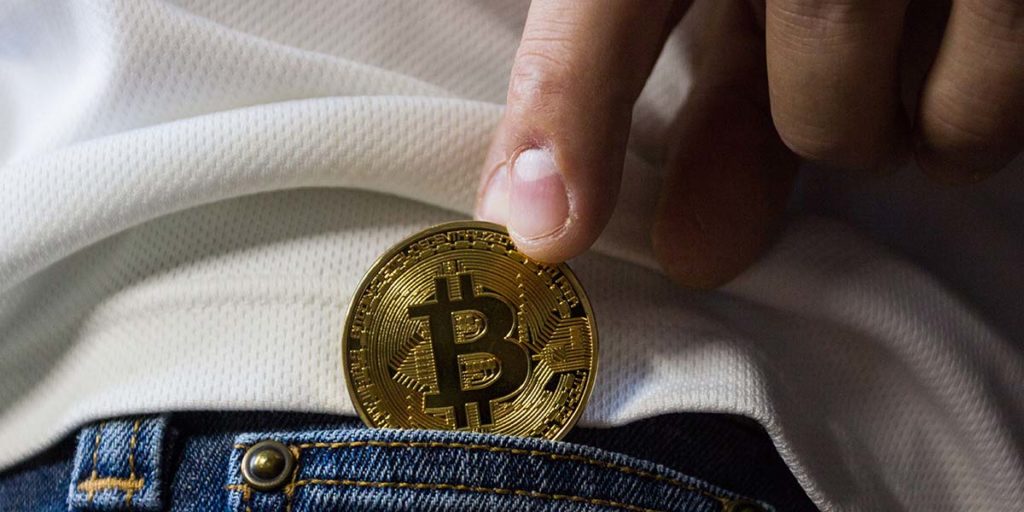Once a gimmick, Bitcoin grew to mature as a digital currency accepted by major companies. In fact, Bitcoin is no longer just digital cash. As its popularity continues to grow in the mainstream economy, more investors begin to realize the value of Bitcoin as an investment. While Bitcoin investment is highly risky, it can diversify your portfolio and prepare you for the wider adoption of cryptocurrencies.
Investors now have more ways to invest in Bitcoin than before. In addition to buying and holding Bitcoins directly, many investors can benefit from indirect Bitcoin investment. This article will go through all the available Bitcoin investment options and help you find the best opportunity for you.

Direct investment – holding Bitcoins
Buying Bitcoins directly is the most straightforward way to invest in Bitcoins. As a Bitcoin holder, your investment’s value will change as the price of Bitcoin fluctuates. Purchasing Bitcoins is becoming increasingly easy. Investors can now buy Bitcoins through three major channels.
Using a Bitcoin exchange
Buying Bitcoins on an exchange is the most common way of investing in Bitcoins. It is simple and convenient, just like buying stocks online. To buy Bitcoins, you need to first open an account with an online exchange such as Coinbase and verify your identity with government-issued IDs. Once your account is approved, you can then buy and sell Bitcoins in real-time with ease.
Buying from a P2P network
You can also purchase Bitcoins from other Bitcoin owners on peer-to-peer (P2P) networks. These networks are similar to eBay. When you buy Bitcoins on a P2P network, you first deposit money in an online seller’s account and the seller will then transfer the Bitcoins to you. As you can imagine, this process can be risky. It is important to buy from trustworthy vendors to avoid fraud. The upside of using P2P networks is that the transactions can are private and anonymous in comparison to buying from a Bitcoin exchange that often requires government-issued IDs during registration.
Depositing into Bitcoin ATMs
Bitcoin ATMs used to be novelties only found in major cities but they are becoming more and more popular. Perhaps, you have seen one of them at your local mall. A Bitcoin ATM works almost exactly like a regular ATM. Instead of depositing cash in your bank account, your cash deposit is converted to Bitcoins and sent to your Bitcoin wallet. Of course, you can also sell Bitcoins to withdraw cash from these machines. Bitcoin ATMs are convenient for small transactions but they charge higher transaction fees just like many ATMs do.
Indirect investment
Holding Bitcoins directly requires the investors to manage a Bitcoin wallet and its safekeeping. Some investors prefer to avoid the technical details of holding Bitcoins themselves but still want to benefit from Bitcoin growth.
Luckily, instead of buying Bitcoins directly, investors can now invest in Bitcoin ETFs, derivatives, and Bitcoin-related stocks, none of which requires the investors to manage Bitcoin wallets themselves. These indirect investment options further provide added benefits useful to some investors.
Bitcoin trusts
A Bitcoin trust pools investor money and invest in Bitcoins collectively. The investors of the trust don’t own Bitcoins directly. Instead, they own shares of the trust and portions of the profits and incomes it generates.
Like other exchange-traded products, shares of Bitcoin trusts can be bought and sold through online exchanges, like regular ETFs and stocks.
Investors make money in two ways when they invest through a trust. First, when the trust makes money from its investment, investors are entitled to a share of that income. The more shares you own, the more income you will receive from the trust. Additionally, investors can generate capital gain income when they sell the shares for a profit.
The share price of a Bitcoin trust is tied to the price of Bitcoins. When a trust’s Bitcoin holding increases in value, its shares are also more valuable. However, the share price can also move independently when demand outpaces supply. When buyers outnumber sellers for a Bitcoin trust, the share price can increase even if Bitcoin price remains the same.
A large demand for Bitcoin trust shares can cause the share price to grow higher than the actual book value of the share. For example, the share price of Grayscale’s Bitcoin Trust is $13.18 on September 4th. But the value of the amount of Bitcoin each share is entitled to is only $10.30. The $2.88 difference is the premium, the extra price you pay for the trust as a result of large investor demands.
Benefits of exchange-traded products
There are several benefits of investing in Bitcoin through a trust or exchange-traded product. First, it is convenient. Investing in a Bitcoin trust is as easy as trading regular stocks. You can buy and sell Bitcoin trusts with your broker without using a cryptocurrency exchange. You also don’t need to manage a Bitcoin wallet or worry about protecting your digital investment against hacking. The trust will take care of all these for you.
Bitcoin trusts also make it easier to invest in Bitcoins through retirement savings accounts such as an Individual Retirement Arrangement (IRA). The tax-advantage of retirement savings accounts reduce or defer income and capital gain taxes on your investments. The tax-benefits allow investments to grow faster. To invest in Bitcoins through a retirement savings account, investors must open a self-directed IRA with a special IRA provider. However, because Bitcoin trusts are traded on exchanges like a regular stock, you can buy and sell shares of a Bitcoin trust with your existing retirement account without additional steps.
Drawbacks of exchange-traded Bitcoin products
When shares of Bitcoin trusts trade with high premiums, investing in trusts is less efficient than buying Bitcoins directly. For example, if you invest $5,000 in Bitcoins directly on September 4th 2019, you can buy 0.468 Bitcoins. However, the same amount of money invested in Bitcoin trusts will only give you shares that contain 0.37 Bitcoins. This is because when a Bitcoin trust has a high premium, part of your money goes towards paying for the premium instead of Bitcoins. With the same amount of money, investors will end up with less Bitcoin investment due to the premium.
Yet, a price premium is not necessarily a bad thing. When you sell your trust shares, the premium becomes your capital gain profit. But if your goal is to invest in as many Bitcoins as possible, Bitcoin trusts are less efficient in maximizing your total exposure to Bitcoins.
Bitcoin trusts also charge a high annual fee from its investors. GrayScale’s Bitcoin Trust (GBTC) charges a 2% annual fee. This fee is higher than the average expense ratio for ETFs. A high annual fee reduces the profits in your hands.
Bitcoin futures contracts
A Bitcoin future is an agreement to buy or sell Bitcoins at a fixed price in the future. Each futures contract specifies the price, amount, and date of the future transaction.

For example, a Bitcoin investor wants to sell their Bitcoins in a month. However, Bitcoin price could decrease in a month, reducing their profits. To protect themselves from a price drop, this investor sells a futures contract for Bitcoin. This contract allows them to sell Bitcoins in a month at, as an example, $9,000 per Bitcoin. With this futures contract, the investor can relax, knowing that price fluctuation will not affect the value of their bottom line.
While the transaction price is fixed, the value of the futures contract does fluctuate. If Bitcoin price goes down to $8,000 in a month, the seller can still sell their Bitcoins at $9,000 and receive $1,000 more than they would thanks to the futures contract. In this scenario, the futures contract has a $1,000 value. On the flip side, if Bitcoin price increases to $9,500, the investor has a loss of $500 from the futures contract.
Most Bitcoin futures contracts settle in cash. This means that there will be no actual Bitcoin exchange on settlement day. The buyer and seller will settle the difference between future price and current price in cash. The investor in the previous example would not transfer their Bitcoins. Instead, the investor will have a cash profit or loss.
Because the value of a Bitcoin futures contract is directly correlated with Bitcoin price, it can be used as an indirect investment in Bitcoin. While investors who own Bitcoin futures don’t own Bitcoins directly, their profit is affected by the price of Bitcoins. Investors can trade these contracts on CME Group and Cboe Futures Exchange.
How do you make money with futures?
Investors can also use Bitcoin futures to benefit from Bitcoin price movement. The values of these contracts move with Bitcoin prices, allowing investors to indirectly invest in Bitcoins.
For example, if you believe that Bitcoin price will rise, you can purchase a Bitcoin future that allows you to buy Bitcoins at a fixed price. If Bitcoin price exceeds the settlement price on your future, you will make a profit. On the flip side, if you are bearish on Bitcoin’s you can sell Bitcoin futures. You will make a profit if the market price goes below the future price.
Benefits of Bitcoin futures
Trading Bitcoin futures has a few benefits. First, Bitcoin futures are indirect investments. Investors can invest the futures on the exchanges without the need to create and maintain a Bitcoin wallet.
Second, Bitcoin futures allow investors to magnify the gains and losses through financial leveraging. When the investor purchases a contract, they only pay a portion of the total contract cost at the beginning. However, the investor is sill entitled to the gains and losses on the total notional. For example, CME group requires traders to pay for 35% in cash for a futures contract. If the future’s settlement price is $10,000 and it goes up by $1,000, your rate of return will be 29% ($1,000/$3,500). On the other hand, direct investment in Bitcoin will only have a return of 10%. Investing through futures give you financial leverage that amplifies gains as well as losses.
Drawbacks of Bitcoin futures
Bitcoin futures can expose investors to excessive risks. Bitcoin is already a risky investment. With leverages, Bitcoin futures multiplies the risk of Bitcoin investment. While the leverage increases your potential profits, it also exposes you to greater losses. Consequently, excessive risks make Bitcoin futures less suitable for most investors.
Lastly, profits from investing in Bitcoin futures depend on the difference between the market price and future price on the settlement date. It is very difficult to predict how Bitcoin would perform on a particular date, making Bitcoin futures a challenging tool to use.
Bitcoin-related stocks
Investors can indirectly invest in Bitcoins by purchasing the stocks of companies that are related to Bitcoins. These companies can benefit from their Bitcoin affiliation. When Bitcoin price rises, these stocks also tend to increase in value as well.

The most notable examples of Bitcoin-related companies are graphics card manufacturer stocks. Because the Bitcoin mining process is extremely intensive and requires a lot of computational power, many miners use graphics cards to mine Bitcoins. With the rise of Bitcoin, major graphics card manufacturers have seen increased demand for their products and rising profits and share prices.
Take Nvidia for example, this company produces high-quality graphics cards, widely used by Bitcoin miners. The high demand from the Bitcoin community led to increased sales and profits for Nvidia. As a result, the company share price also rose along with Bitcoin prices, as shown in the graph below. For the chart below, the price for each day is indexed to January 2nd 2014 to show the relative relationship between Bitcoin price and Nvidia share price.
Stocks such as Nvidia can be used as an indirect investment for Bitcoin, allowing investors to benefit from Bitcoin exposure without actually holding Bitcoins themselves.
Benefits of investing in Bitcoin-related stocks
Investing in a stock is less risky than investing in Bitcoin directly. While the price movement for Bitcoin is extremely volatile, stock performances are more stable in comparison.
The value of Bitcoin is largely decided by supply and demand, which makes Bitcoin price unstable. On the other hand, stock prices are most affected by the company’s profitability, a tangible number that can be observed and evaluated. Furthermore, company stocks have intrinsic values. Each stock represents a share of the assets owned by the company such as real estate, production equipment, and intangible assets. Bitcoin price can fall to zero but a company’s stocks have a lower bound determined by the actual value of the company. Thus, investing in these stocks is less risky than directly holding Bitcoins.
Additionally, investing in Bitcoin-related stocks allows investors to evaluate these investments with tools they are familiar with such as fundamental analysis. Publicly traded companies release a wide range of information on their operation and profit which allows investors to make informed decisions.
The drawbacks of investing in Bitcoin-related stocks
Buying a Bitcoin-related stock is perhaps the most indirect way to invest in Bitcoins. The correlation between Bitcoin price and stock prices is not guaranteed. A rise in Bitcoin price might translate into a higher share price but the correlation can also disappear. Additionally, there are other factors that affect stock prices in addition to Bitcoin, such as company profits, business growth, and management decisions.
It is important to remember that when you buy a stock, you are investing in that company.
The impact of Bitcoin is only secondary and not the main objective. Consequently, investors do not get the full profit or loss of direct Bitcoin investment.
Know why you want to invest in Bitcoins
As an investment, Bitcoin can provide diversification to your portfolio. It can also help future-proof your portfolio and help you stay updated on the development of crypto technology.
However, it is important to remember that Bitcoin investment is highly risky and some indirect investing methods can even amplify the risk. While the profit from Bitcoin investment can be attractive, investing in Bitcoins, directly or indirectly, should be a well-thought decision with a clear purpose.




